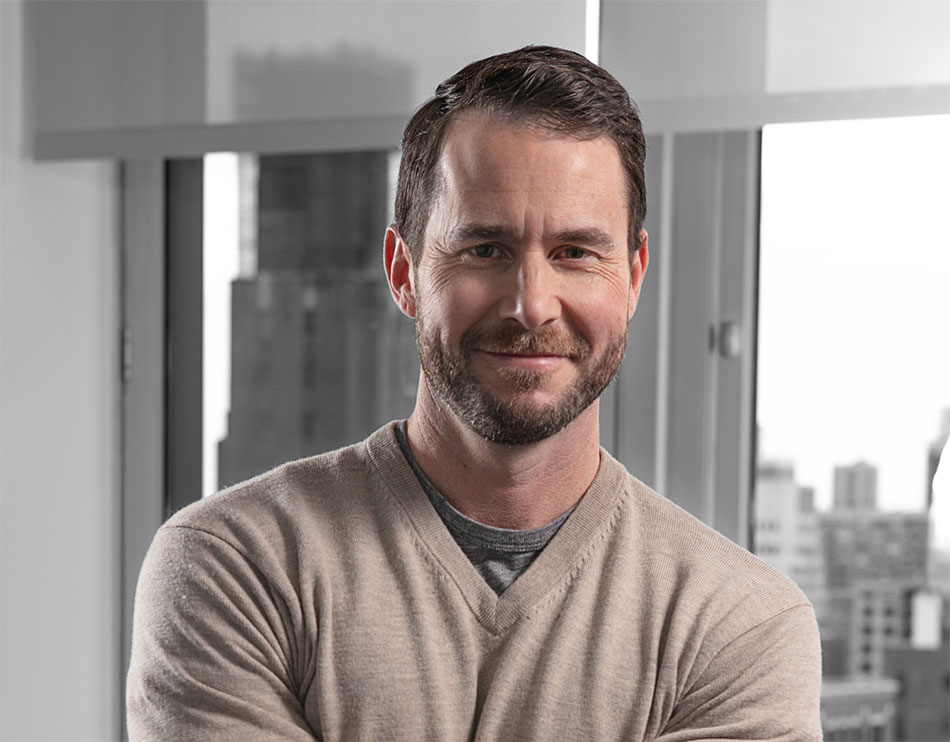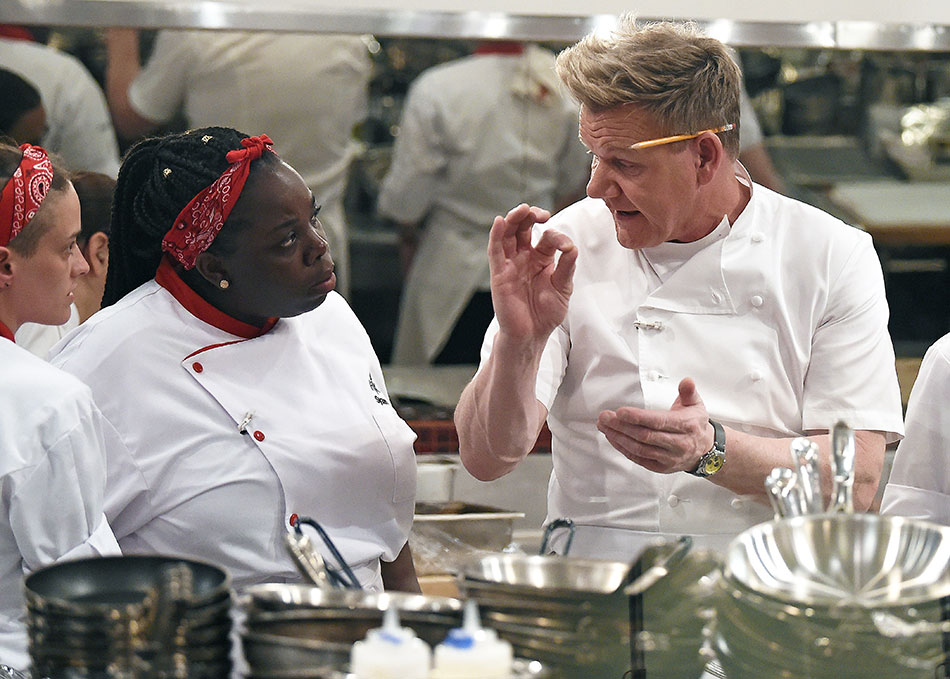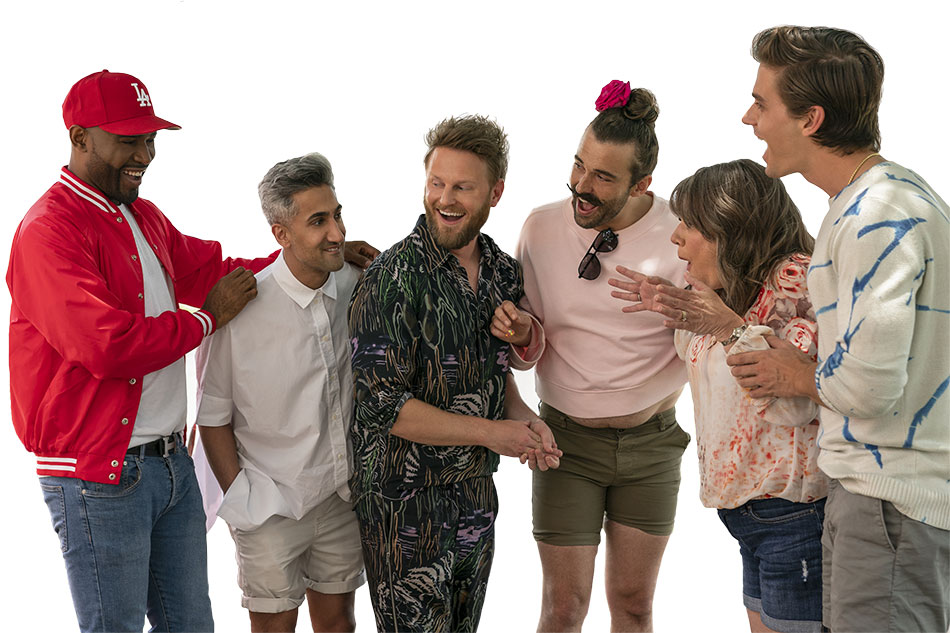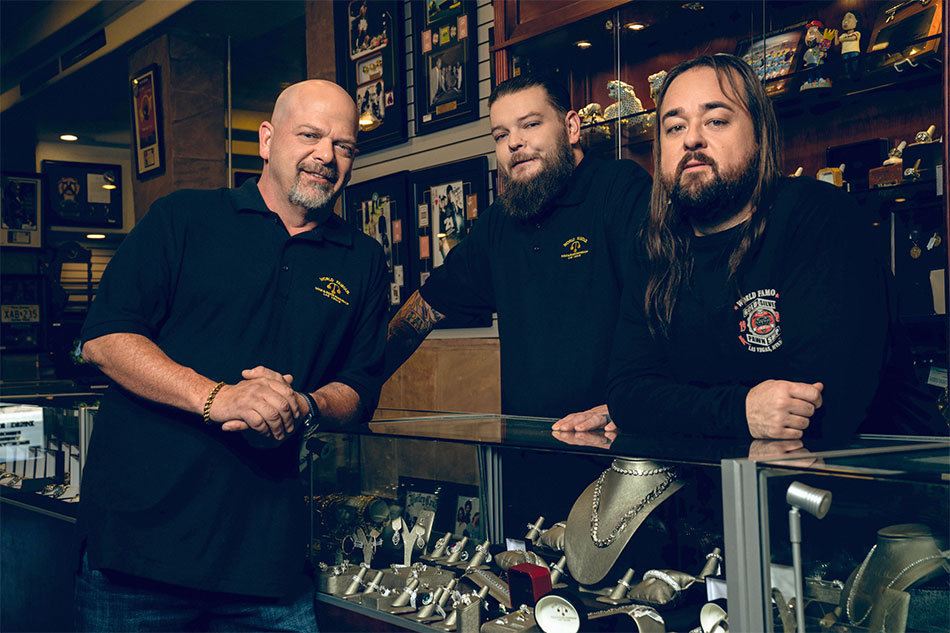Producer of the Year: By George, That‘s Prolific
CEO David George makes ITV America a ‘one-stop shop’ with reality series up and down the dial — and across platforms

The smarter way to stay on top of broadcasting and cable industry. Sign up below
You are now subscribed
Your newsletter sign-up was successful
ABC on Jan. 4 debuted a reboot series of the venerable British game show The Chase, which sees three contestants challenge a celebrity “chaser” — a quiz genius who looks to eliminate all comers.
Three days later, Fox premiered the 19th season of iconic culinary competition Hell’s Kitchen, starring chef Gordon Ramsay. The series has a new, glitzy Las Vegas location, but it's the same old Ramsay as he puts would-be chefs through rigorous kitchen challenges.
The common thread between the rebooted game show and the veteran competition series is that they are both produced by the same company, ITV America, led by CEO David George.
In fact, the two shows are among more than 50 unscripted series the company and its six partner production companies — Leftfield Pictures, ITV Entertainment, Sirens Media, High Noon Entertainment, ThinkFactory Media and Good Caper Content — are scheduled to produce in 2021. The more than 400 hours of content ITV America will develop includes some of the most successful and long-running series on television across multiple platforms: Netflix’s Emmy-wining series Queer Eye, History’s iconic Pawn Stars, Bravo’s The Real Housewives of New Jersey and CBS’s Love Island.
“David is one of the most talented, creative executives I’ve ever worked with,” said Julian Bellamy, managing director of ITV Studios and George’s direct report. “He’s got a brilliant blend that includes the beating heart of a producer and a really clear-thinking strategist and business brain.”
Indeed, George — a former MTV producer who, after serving as president of Leftfield Entertainment, took over the reins of ITV America in 2018 — has deftly led the company through a turbulent time in a television production industry damaged last year by a once-in-a-century pandemic and challenged by a changing business model that has created more distribution outlets but also more competition. In 2021, ITV America will produce content for 17 cable networks, four broadcast networks and eight streaming services.
“One only has to look at his team’s track record to see that it’s second to none — his team has had a phenomenal track record on-screen, whether it be Queer Eye or Love Island, The Chase or Hell’s Kitchen,” Bellamy said. “What they’ve done in the past few years is be very smart as to anticipate the market’s evolution and the diversification of the business not only in the broadcasting and cable space, but working with other new platforms and buyers.”
The smarter way to stay on top of broadcasting and cable industry. Sign up below

George has the unique ability to combine strong production instincts with a keen business acumen that allows him to recognize and foster successful programming, said Corie Henson, executive VP and head of unscripted programming for TBS, TNT and truTV. Along with Rat In the Kitchen, a new culinary-themed show launching later this year on TBS, Henson said ITV America is also producing shows for WarnerMedia featuring former WWE star John Cena and NBA superstar Russell Westbrook.
“He comes from being a producer, so he understands how a show gets made and how much it costs, how to work with talent and tell a story,” said Henson, who, when she was a production executive at Fox, worked with George on Hell’s Kitchen. “When that knowledge comes down from the top of the company, there’s a trickle-down respect for the producers and the production. He’s now really embraced the business aspect of the company and has an ambitious and aggressive approach, but he always does it with an approachable style.”
During the pandemic of 2020, when many production companies were forced to shut down production to keep COVID-19 from spreading, George and his team worked to create safety measures to continue the production of shows such as Love Island and History’s Forged in Fire that helped provide much desired original content (and preserved jobs).
“They came up with ways to actually make new episodes for one of our longest-running franchises, Forged in Fire, even when everyone was sheltered ... that was really smart, innovative and successful,” A+E Networks president of programming president Rob Sharenow said. “It’s that kind of collaborative thinking and calm when facing extreme obstacles that is part of the key to their success. That’s a great example of where they were really able to respond to a show our viewers really wanted, and they found a way to deliver.”
Bellamy said George’s decision to contain the stars and crew of Love Island within a Las Vegas-based bubble environment to finish shooting the show’s season highlighted George’s leadership abilities under extreme duress. “You find a lot out about people when everyone’s back is up against the wall,” he said. “We all know how challenging that has been ... but the fact that they were able to make the show with the quality that they did is a remarkable testament to the whole team and Dave’s leadership.”
George’s ability to manage and facilitate the delivery, innovation and creation of memorable, popular and successful original content has earned him and ITV America Broadcasting+Cable’s Producer of the Year nod for 2021. George spoke with B+C about the company’s programming success, its current and future business strategy and the evolving television marketplace. Here’s a version of that conversation edited for space and clarity.
B+C: How do you see each of ITV America’s production brands working together to create a formidable player in a very competitive, unscripted series space?
David George: When we started down the path of really focusing our labels as brands, it was really about the market wanting to buy from a producer who has had experience in that genre. Some of them were very easy to define — you take a company like High Noon, which is known for Cake Boss and Fixer Upper, and you say that it is our pinnacle lifestyle brand — they do food and home [content] to the nth degree. Then you take a label that we launched, like Good Caper, which was us saying, “we have a bit of a void in the crime programming space and we need to be great in there.” So we really look at things on a genre-by-genre basis. Left Field, they do [History’s] Pawn Stars and Alone, so we have them focus in the male space; ITV Entertainment is our big gaming format. Then you have ThinkFactory, which is really focused on the big, loud talent. Sirens is our female pop-culture vertical.
Then we have some other partnerships like Kimmelot — Jimmy Kimmel's company — and we work with them very closely on a lot of comedy. We just did a big partnership with Nobody's Hero, and they do really loud, off-the-wall formats. So that's where we're kind of focused right now. It really is about us being that one-stop shop.
B+C: You mentioned a couple of iconic shows that ITV America produces, which also includes [Fox’s] Hell’s Kitchen, that have stood the test of time and continue to have success. How do you continue to breathe life into these shows in a crowded environment where new shows are being rolled out consistently?
DG: First of all, known IP [intellectual property] is such a valuable commodity these days. It’s so hard to break a new show. A known commodity is really a great value, particularly in broadcast and cable, because they're really trying to hold onto their audience and their demographics with the streaming services coming online. So, you want to creatively refresh those shows as often as you can, but you want to keep the core of those shows true. I think Hell’s Kitchen is a prime example of us taking a little bit of a different spin and making it a bit more exciting by bringing it to Las Vegas and doing something different with the show to make it feel fresh, but not turning the core viewers off. Those shows that have been around for a long time are known and proven commodities in this marketplace. They’re almost irreplaceable for certain sectors.

B+C: One of those shows also is Queer Eye on Netflix. What was it about that particular IP that made you believe it could be successfully rebooted on Netflix?
DG: Queer Eye was an interesting case. We were sitting around talking about the show one day and wondering what was going on with it. Lo and behold, [series producer Scout Productions] was in conversations with Netflix about bringing the show back, but they didn’t do physical production — they were looking for a producing partner to come in and be the producers with them. So, we said this is an iconic show [as Queer Eye for the Straight Guy, it ran on Bravo from 2003 to 2007], but it can’t be the same show when it comes back, particularly on Netflix. You have to reimagine what that show is.
Ultimately, that show transformed from a meat-and-potatoes makeover show to being the social zeitgeist of what’s going on in America. I think that move of flipping it on its head and sending the Fab Five into, for a lack of a better word, ‘red states,’ was a fresh thing to do because the country is so fragmented. To show that the Fab Five can go into these red states and find those connection points with people from completely different backgrounds and values is such a tremendous thing to watch. I think it’s something that this country is so desperate to see. I just think that was the secret sauce of that show, and why it worked on Netflix, and why it was able to reboot so successfully.
B+C: Has the move by streaming services into unscripted programming changed your strategy as to how and where to pitch a particular show?
DG: It’s interesting to watch the business change before our very eyes. We knew change was coming, but I just don’t think we knew it was coming this fast. The pandemic really has accelerated the timeline for linear buyers to point their resources and direction towards the streaming platform. So when we evaluate where we’re selling, we don’t just look at a linear network only, but we also think about, what is the streaming platform that is associated with this network? That’s because ultimately, the success of a show on linear is sometimes going to also need that support of the streamer. All of these things are just conduits to where we can pipe content, and to me that is the future.
I think it’s very Dickens — it’s the best of times, it’s the worst of the times. You never have a conversation now where you say, this is how much a show costs, and the network just says, sure. That never happens.
— David George, CEO, ITV America
So when we come up with ideas, the first thing we think is, where would this make the most amount of sense? Where’s the audience for this idea? Second thing is, can this place afford this idea? Because the truth is, the numbers are leading the creative now in this business, whereas before the creative used to lead the numbers.
For us, what we’re seeing is that the streamers in a lot of cases have bigger budgets to play with versus even broadcast right now, which is shocking. When you think about it, broadcast was this $2 million-per-episode world that you were playing in, and it’s not really like that anymore. When you look at the linear ratings, they can’t support those price points.
The tricky part with the streamers, though, is you don't really know how a show performs. Is it really worth the amount of money? But the truth is content is just measured differently [in digital], right? Let’s go back to Queer Eye for a sec. Is Queer Eye getting 5 million views or 10 million views globally? I have no idea. But my hunch is that Queer Eye has such a following and importance to people that they’re willing to renew their subscription to Netflix for that show, so that show has true value for a streamer.
So in the streaming world, I don’t know if it’s necessarily about 50 million viewers watching your show as much as it is, ‘I will renew my subscription just to be able to see that.’ In a nutshell, we want our content to be supported properly from a funding standpoint, but we also want it to go places where we think it can have a long shelf life. Whether that’s at cable, at broadcast or at a streamer, we’re always going to evaluate on those levels.
B+C: Given the fact that there are so many players now in the marketplace, is this the best time for a content producer like ITV America to be in the business?
DG: I think it’s very Dickens — it’s the best of times, it’s the worst of the times. You never have a conversation now where you say, this is how much a show costs and the network just says, sure. That never happens. So I think you're in a constant dogfight with funding creative properly, given higher network expectations. So that makes it incredibly difficult to produce.

But at the end of the day, it’s still a great time, because if you have an idea, there’s probably a platform out there for it. There are so many other places coming online. We had high hopes for Quibi and it didn't work out, but at the end of the day you have to respect that they took a swing and went for it. There’s so many other places that are talking about getting into the content game, whether it’s Roku or Paramount Plus now coming out for CBS. It’s a whole new world and we’re in the center of the storm, so to speak, especially with all the consolidation.
I think when we come out of it, we’re going to see very streamlined buyers and you’re going to see a wide range of content. You’re also going to see big-budget shows coming through, and you’re going to see that there are places for any idea.
B+C: Around this time last year, this whole new world you referenced was turned on its head with the emergence of COVID-19. How damaging from a business perspective was the pandemic for ITV America, and how was the company able to pivot forward?
DG: I think ITV America was very lucky because we were lined up to have a very good year. Now that very good year turned into just an OK year. From a business standpoint, we were able to weather the storm and I have to give credit to our entire team for figuring out how to get our shows into production safely and to take care of our people. We were fortunate enough not to have to do layoffs or salary reductions. It tested everybody’s mettle in terms of how can we actually produce right now, but I always think people are defined in bad times, not in good times, and this team that works at ITV America are the best in
the business.
Whether it’s figuring out how to take over 300 edits and turn them remote within two weeks so people can edit shows from home, or our COVID committee meeting every single week to talk about productions, positive tests, shutdowns and how we’re going to safely get these productions back, it really makes me proud about how we weathered that storm. Even our network partners stepped up to the plate to help us with some of these costs. When you are a CEO, there’s always the reality of how the business is doing, but then there’s that level of whether we are a good enough team to weather this and to get through the other side. The other side isn’t quite there yet, but we’ve done a great job so far.
B+C: What’s the most important criterion for making a successful series? Is it talent? Is it format? Is it genre?
DG: The secret sauce to me is that unique element with every idea that separates it from the pack. When you go and pitch an idea to a network, very rarely do you go in and say, I’ve got an idea for this show, and they say I’ve never heard anything like that. It's always that little kernel that kind of flips it on its head. What I like most about that is I love a hidden trait of a show that doesn't necessarily register with you but is a core element of the show.
An example of that is TRL [MTV’s Total Request Live], which was the first show that I ever worked on. Everybody looks at that show as a music countdown show with guests that come on and perform. My take is that that was a competition show between artists. I don’t think people ever really looked at TRL like it was a competition show, but people were so passionate about those artists that they would go and vote every single day, and show up in Times Square just to get a glance at them. They would go nuts because they wanted to show their passion for those people, and they wanted their band to beat your band. That to me is that hidden little gem within that show that separated it from the pack, and I don’t think people really even understand that.
Fast-forward to today: I think Pawn Stars is a game show because you play along at home and wonder what [series star Rick Harrison] is going to pay for this, so you’re playing along to see the results. I don’t think The Masked Singer is a singing competition show, but a game show: You’re trying to guess who that person is.

Look at [History series] Alone, one of our shows that I think is very unique. What makes that unique is the circumstance that we put people in. There are no producers around — they are completely on their own, living out in the wilderness, and they’re producing themselves. The danger is real, and to the viewer, they realize that we’re not trying to pull the wool over their eyes, and people trust that brand because of it.
It’s that level of connection that you have to have with the viewer that separates a great idea from a bad idea. It doesn’t happen all the time, but when you get it, that’s when those shows break through and become massive hits.
B+C: What role does diversity play in terms of the development of shows and are you satisfied with where you are in terms of inclusive content?
DG: When I look across our portfolio, I think there are some great things and there are some things that we need to work on. We are making a very conscious effort to go down the path of more diversity within our lineup. There are some really exciting things that are coming from us that will stamp that. For us though, the most important thing for any company is to be reflective of society and to become more diverse. It’s about creating opportunity for people and becoming a place where people want to come and work.
I think diversity is a huge priority for us as well as for the industry. I think the events of the last year have awakened a lot of people to the reality that we need more diversity within television and unscripted in particular.
— David George, CEO, ITV Amerifcas
For me, that is the No. 1 priority for us — how do we diversify our workforce and become a place where diverse storytellers feel like they want to come and tell their story to us? If we do that, it’s very simple: the workforce becomes more diversified, your content becomes more diversified, and you become more reflective of society. I have literally rubber-stamped across our company that this is a massive priority for ITV America moving forward, but it’s a long process. [Note: ITV America’s diverse shows include Food Network’s Cupcake Guys Training Camp and OWN’s Love & Marriage: Huntsville].
B+C: Will ITV America look to expand and add more production companies to its portfolio?
DG: We’re very open to partnerships and are actively exploring partnerships, particularly with creators that don't want to build something as big as ITV. The physical production game is incredibly difficult right now, and we have the size and scale to support people who maybe can’t afford all of that infrastructure, but they’ve got great ideas and they want to have that level of support. Those are win-win partnerships for us [and] I think, in the end, you’re going to see more and more of those happening across the board. I think some of these production companies coming out of this pandemic are going to be struggling because some of their shows won’t have gotten into production, so I think a lot of producers out there are evaluating their business model.
For us, we’re trying to stay as steady as possible, and a steady hand right now is a commodity in this business. Hopefully producers want to keep partnering with us.
R. Thomas Umstead serves as senior content producer, programming for Multichannel News, Broadcasting + Cable and Next TV. During his more than 30-year career as a print and online journalist, Umstead has written articles on a variety of subjects ranging from TV technology, marketing and sports production to content distribution and development. He has provided expert commentary on television issues and trends for such TV, print, radio and streaming outlets as Fox News, CNBC, the Today show, USA Today, The New York Times and National Public Radio. Umstead has also filmed, produced and edited more than 100 original video interviews, profiles and news reports featuring key cable television executives as well as entertainers and celebrity personalities.

